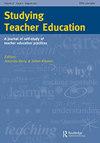Universal Design for Learning in a Teacher Residency: Re]Framing Tensions through Collaborative Self-Study
IF 1.5
Q2 EDUCATION & EDUCATIONAL RESEARCH
引用次数: 1
Abstract
ABSTRACT Over the past two decades, interest and support for Universal Design for Learning (UDL) has prompted many teacher education programs in the United States to incorporate it into preservice curricula. Developed by CAST, an educational nonprofit, the UDL framework aims to support the design of inclusive educational environments by minimizing barriers to learning, and building on student variability as a starting point for instructional and curricular design. Despite UDL’s recent growth at multiple levels of education, there remains a dearth of research examining practitioners’ experiences working with the framework. The purpose of this self-study is to analyze tensions that emerged as we, a team of five teacher educators, attempted to apply Universal Design for Learning (UDL) in our own practice in a rural teacher residency (TRRE) program. We analyze our incorporation of UDL, the tensions we experienced, the factors contributing to those tensions, and the ways we responded to them. The two main tensions were: (a) balancing UDL’s strategies with its necessary shift in mindset, and (b) grappling with UDL’s concept of barriers alongside the necessary cognitive dissonance of the learning process. We conclude by offering implications for research and practice as we continue to navigate these tensions and incorporate UDL into our practice.教师实习学习的通用设计:通过协作式自学重新构建紧张关系
在过去的二十年中,对通用学习设计(UDL)的兴趣和支持促使美国许多教师教育项目将其纳入职前课程。UDL框架由非营利教育组织CAST开发,旨在通过最大限度地减少学习障碍,并将学生的可变性作为教学和课程设计的起点,来支持包容性教育环境的设计。尽管UDL最近在多个教育层次上得到了发展,但是仍然缺乏对实践者使用该框架的经验的研究。本自学的目的是分析我们,一个由五名教师教育者组成的团队,在我们自己的农村教师驻留(TRRE)计划实践中,试图应用通用学习设计(UDL)时出现的紧张局势。我们分析了我们对UDL的整合,我们所经历的紧张局势,导致这些紧张局势的因素,以及我们应对它们的方式。两个主要的紧张关系是:(a)平衡UDL的策略和必要的思维转变,以及(b)在学习过程中必要的认知失调的同时,努力解决UDL的障碍概念。最后,我们为研究和实践提供了启示,因为我们将继续处理这些紧张关系,并将UDL纳入我们的实践。
本文章由计算机程序翻译,如有差异,请以英文原文为准。
求助全文
约1分钟内获得全文
求助全文
来源期刊

Studying Teacher Education
EDUCATION & EDUCATIONAL RESEARCH-
CiteScore
2.40
自引率
43.80%
发文量
23
期刊介绍:
Studying Teacher Education invites submissions from authors who have a strong interest in improving the quality of teaching generally and of teacher education in particular. The central purpose of the journal is to disseminate high-quality research and dialogue in self-study of teacher education practices. Thus the journal is primarily a forum for teacher educators who work in contexts and programs of teacher education.
 求助内容:
求助内容: 应助结果提醒方式:
应助结果提醒方式:


